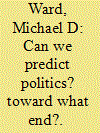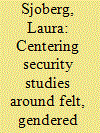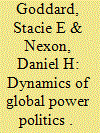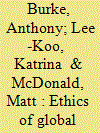|
|
|
Sort Order |
|
|
|
Items / Page
|
|
|
|
|
|
|
| Srl | Item |
| 1 |
ID:
145152


|
|
|
|
|
| Summary/Abstract |
In 1901, off the Greek island of Antikythera, a ship pulled into a bay to wait out a storm. After the storm was over, its divers discovered an ancient shipwreck containing many valuable antiquities, including jewelry, coins, statues, and pottery. One item was a lump of corroded bronze and wood. Everything was carted off to the National Museum of Archeology in Athens. In 1902, an archeologist noticed that the corroded lump had what appeared to be gears in it. He assumed that it was some sort of astrological clock, but it appeared to be too far advanced given the dating of the other items it was found with, which were initially dated to about 150 BCE, and it was ignored for five decades. Several years later, it was X and γ rayed, resulting in images of eighty-two different fragments of the device.
|
|
|
|
|
|
|
|
|
|
|
|
|
|
|
|
| 2 |
ID:
145150


|
|
|
|
|
| Summary/Abstract |
This article draws on two decades of work in feminist security studies, which has argued that gender is necessary, conceptually, for understanding the concepts of war and security; important, empirically, for analyzing causes and predicting outcomes in the field of security; and essential to finding solutions to insecurity in global politics. The work of feminist security studies suggests that one of the most persistent features of the global political arena is gender hierarchy, which plays a role in defining and distributing security. The argument in this article moves from talking about the security of gender to discussing the gendered sources of insecurity across global politics. It then builds on existing work in Feminist Security Studies to suggest a felt, sensed, and experiential notion of the security/insecurity dichotomy as a new way to think about global security (studies). A (feminist) view of “security as felt” could transform the shape of a number of research programs in security studies.
|
|
|
|
|
|
|
|
|
|
|
|
|
|
|
|
| 3 |
ID:
145147


|
|
|
|
|
| Summary/Abstract |
We call for a research program focused on the dynamics of global power politics. Rather than link realpolitik to structural-realist theoretical frameworks or the putatively anarchical character of world politics, the program treats power politics as an object of analysis in its own right. It embraces debate over the nature of global power politics among scholars working with distinctive approaches. It sees the structural contexts of power politics as highly variable and often hierarchical in character. It attenuates ex ante commitments to the centrality of states in global politics. And it takes for granted that actors deploy multiple resources and modalities of power in their pursuit of influence. What binds this diverse research program together is its focus on realpolitik as the politics of collective mobilization in the context of the struggle for influence among political communities, broadly understood. Thus, the study of the dynamics of collective mobilization—the causal and constitutive pathways linking efforts at mobilization with enhanced power—brings together approaches to security studies in a shared study of power politics.
|
|
|
|
|
|
|
|
|
|
|
|
|
|
|
|
| 4 |
ID:
145151


|
|
|
|
|
| Summary/Abstract |
The security agenda is going global. Key threats such as weapons proliferation, disease, terrorism and climate change cannot be addressed unilaterally by states, and require a global perspective to both understand and respond effectively to them. There are therefore powerful pragmatic reasons for embracing a global security perspective. This article, however, suggests that a compelling moral case also exists for viewing security in global terms. National and international security discourses are at odds with the realities of world politics and orient towards the preservation of a status quo that is failing much of the world's population, now and into the future. In this context, this article makes a case for cosmopolitan ethical principles underpinning a global security perspective. Only an ethics that does not discriminate between groups is defensible as a general set of principles. A global security perspective should be underpinned by three cosmopolitan ethical principles which dictate, firstly, that all security actors have responsibility (albeit differentiated) to create security for all; secondly, they should act with consideration of the future implications of their actions in mind; and, thirdly, they should proceed as if their actions will become global over time and space. While not without challenges and dilemmas, such a perspective is urgently needed in contemporary global politics.
|
|
|
|
|
|
|
|
|
|
|
|
|
|
|
|
| 5 |
ID:
145149


|
|
|
|
|
| Summary/Abstract |
What does taking dead bodies seriously tell us about the state of global security studies? Dead bodies play different roles in conventional, human, and critical security studies and thus thinking about them opens conversations among these different approaches. This paper pushes further to argue that scholars should think about the global dead as an analytical category. It demonstrates that doing so will allow us to rethink the measurement of war casualties, and examine the assumptions embedded in quantitative casualty data, the ethnography of these numbers, and the politics of representing them. Establishing the dead as an analytical category also widens the lens of dead body management to examine how dead bodies are not only objects but also subjects of security. This should lead us to ask about the politics behind how they are secured and governed, as well as the political and legal structures in place to manage them. Corpses matter for how we define security and they matter a great deal for a wide variety of security behavior. Up until now, security scholars have treated them implicitly but we can understand much more about the politics of the dead if we make them an explicit category of study.
|
|
|
|
|
|
|
|
|
|
|
|
|
|
|
|
| 6 |
ID:
145148


|
|
|
|
|
| Summary/Abstract |
The changing political and social meanings of space under conditions of advanced globalization point to the need to analyze security—or the deployment and management of violence—as a socio-spatial practice. This article draws attention to the “methodological nationalist’ bias that has traditionally characterized mainstream security studies, and discusses its effect on how security issues are studied and conceptualized. Building on insights from political geography and sociology, the article makes the case for a “spatial turn” in the field. It demonstrates how a socio-spatial approach can help make sense of evolving state security practices, and presents examples of non-national spaces of security—including cities, cyberspace, and the global polity. Such spaces are increasingly objects of security practices, although the implications of this remain largely under-theorized in security studies.
|
|
|
|
|
|
|
|
|
|
|
|
|
|
|
|
|
|
|
|
|